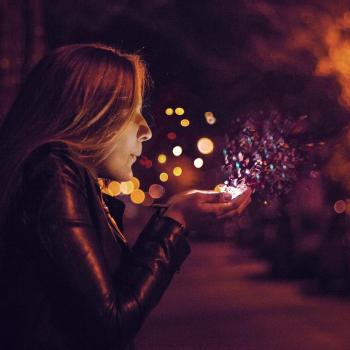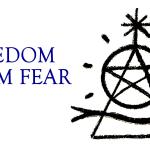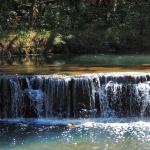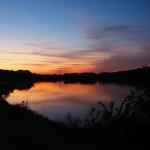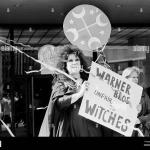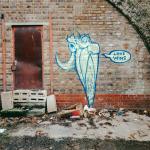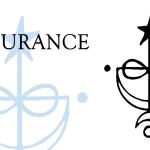I am thinking about how to teach what I actually know, which is far more than just the Craft, although I would include the advanced but non-oathbound information I have about the Craft, and about religion in general, about spiritual progress, how to reinvent oneself, how to shed all the pernicious nonsense our society teaches to children. For the Craft aspect, the capstone would have to be taught in circle, under oath, without any monetary tuition being paid. I have no clue at the moment how I could accomplish that.
I do believe in the profound importance of that rule for the viability of the Craft as a religious movement. It has served us well so far and must continue to do so. It’s as important as AA’s Twelfth Tradition: “Anonymity is the spiritual foundation of all our Traditions, ever reminding us to place principles before personalities.” I wish more in the Craft understood the importance of “Our leaders are but trusted servants. They do not govern”—the reason why I would place flowers on Kropotkin’s grave if I ever got to visit Moscow.
I certainly am never going to be able to teach any of that as an employee of any college. There’s a wonderful article I found on Linked in about how the transition to online courses is going to transform the dinosaur of American “higher” education into something more like a vole. And high time. As the millions of adjunct instructors in America know, the whole system is antiquated and corrupt. Here’s the link:
In theory, I could teach online courses on anything non-oathbound, using video clips, a chatroom for discussions, and other technology that is daunting for me, but that my techie wife could help me with. Right now, people would need to come to Tacoma for the oathbound stuff and the “final exam.” That would require some logistics. Our coven is essentially two families and a few friends. It could not cope with an influx of many new people.
So what are my qualifications for such teaching? On the Craft side, I helped create the New Reformed Orthodox Order of the Golden Dawn. It works quite well. The initiations are quite efficacious. I do think that an initiation should produce an altered state of consciousness, and ours do. They’re not even secret or oathbound, but we do try to avoid spoiling the surprise for our initiates. I also have Feri initiation from Victor Anderson, with training by Valerie Voigt. And I am a Third Degree Gardnerian, with a lineage going back to Dafo (Edith Woodford-Grimes). I don’t think she used the title “Lady”—that would have been presumptuous in England 60 years ago—and if course I have no idea if the lineage extends back from her. Our coven does not practice Gardnerian. My wife is 1734, has no use at all for Gardner or Gardnerians, and refuses to call herself Wiccan.
On the academic side, I have an MA in Poetry from San Francisco State and a Ph.D. in Theology from the Graduate Theological Union in Berkeley. The latter sounds rather conservative, but in fact the GTU is simply a private graduate school, even though most of its faculty are also the faculty of at least seven different denominational seminaries, and what I was studying would be classified as Advanced Humanities. At the GTU I could design my own doctoral program and therefore study what I was interested in, instead of being an indentured servant doing the grunt work on whatever research a professor told me to do, which is the medieval system still in use in most graduate departments. All I had to do was convince the Doctoral Committee that my program was of high enough quality, which I did.
My GTU program was also Oxford style; that is, it did not have any required courses. Instead, I had to take comprehensive examinations on four broad fields of knowledge. The first one covered all of Jewish and Christian writings and history up to the Council of Nicaea; for the exam, I wrote a paper demonstrating a connection between the Gospels of John and Thomas, for Antoinette Wire, one of the translators for the Nag Hammadi Library in English. For all that I also learned to read Greek and Coptic, to be sure no one was cheating. I also figured out how Christianity actually got started; it has very little to do with the official myth taught by the Roman Catholic Church.
The second topic was Classical Greek and Hellenistic history, literature, and religion. For that I wrote a timed, closed-book examination on the cultus of Demeter, including the Eleusinian Mysteries, for the late Professor Joseph Fontenrose, who was the Chairman Emeritus of the Classics Department of UC Berkeley. I also had the mind-bending experience of reading through the Neoplatonic curriculum as outlined by Iamblichus, with Professor John Dillon, then the Chair of the UC Classics Department, who said I was probably the first man in a thousand years to have done that. Believe me, you ain’t missed a thing. I did learn that almost all of the most crackbrained and morally repugnant aspects of Christian theology come from Plato and the other Pagan philosophers, not from Judaism.
The third topic was in the field of New Religious Movements, although neither that term nor the label Pagan Studies had yet evolved. For it, I wrote a book analyzing the origins of an NRM, specifically, Gardnerian Wicca. I was able to do so because the Gods, as mediated by Charles Clark, Carl Weschcke, and Isaac Bonewits, put in my hands almost all of the Book of Shadows as typed by Gardner himself, and then led me to Ye Bok of ye Art Magical, the prototype of the BOS as handwritten by Gardner; it is now owned by Richard and Tamarra James of the Wiccan Church of Canada. My research conclusions were finally published in simplified form in my Crafting the Art of Magic and more recently in Inventing Witchcraft. The former is out of print; the latter is available on Amazon.
The fourth topic was the psychology of creativity. For that, I submitted a portfolio of original works in prose, poetry, and music. This segued into my dissertation, which was on the theology of comedy, in the form of a three-act musical comedy with an almost complete score. It is set at the wedding banquet of Hades and Persephone, and incorporates almost all of the “Oratorio with Dancing” that we created as the NROOGD’s Mabon ritual. I began teaching just before I received my degree, which was on my fortieth birthday, and have taught at a dozen different colleges and universities since then, always as an adjunct.
That all sounds very respectable, doesn’t it? A lot of it is useful background. However, what I have to teach that I believe is most important lies along the trajectory that began with my “conversion” experience at age 14. I have described that experience in some detail in earlier blogs; you can go back and look at that. There is no adequate vocabulary for describing or even naming such experiences; they are too uncommon. Calling one a “conversion” sounds like it was a conversion from one faith tradition to another. Mine was not. Instead it freed me from all faith traditions, from ever again being a “true believer” in anything. Rather, it was a conversion from ignorance to knowledge, that is, to Gnosis. I understand the ancient Gnostics in a way impossible for someone who has never had such an experience, who cannot conceive what such an experience might be like, who probably does not believe that such an experience even exists. One sees many once-born psychologists going through contortions trying to argue that such experiences are actually hallucinations.
My experience put me on a trajectory of exploring all things religious for myself, never believing anyone else’s opinion. I need to teach what I’ve learned along that path. Much of it is foundational. As an analogy, almost all religions are parallel to Newtonian Physics; what I have been working on is more like quantum mechanics. It incorporates what one must learn and do in order to cope with a “spiritual emergency.” There’s not much more I can summarize here. It would be far more like Wicca 505 than 101.
Comments will be welcome. If you want to know more, you can message me on FB.




